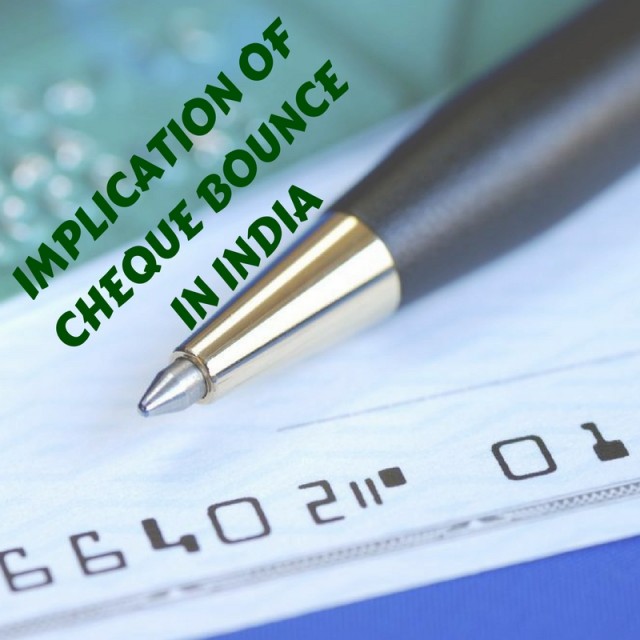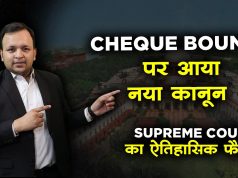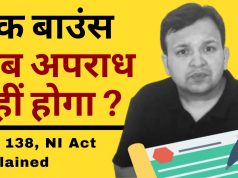Before we study about cheque bouncing, we should know about few basic terms. Which will help us in knowing cheque bouncing term better. Cheque bouncing is also known as cheque dishonored. Cheque is a negotiable instrument. Cheques are issued either for the reason of statutory requirement or for the reason of securing proof of payment. This instrument has to be deposited into his bank account. There are two parties involved in it “Drawer” and “Drawee”. It is advisable not to keep blank cheques. A validity for cheque is 6 months and after that cheque is known as “stale cheque”.
Cheque Bouncing happens when a cheque becomes due for payment on the date mentioned on it. Before issuing, a cheque author (Person who pays) of the cheque should ensure that he has sufficient funds in his account otherwise it would bounce with remarks ‘insufficient funds’. Bouncing in common parlance is referred to dishonor of cheques.Cheque bouncing is a criminal offence. There are specific punishment under the Negotiable Instruments Act, 1881. Since 1881, there are many provisions were added in this act for better functioning. Under section 138 of Negotiable Instruments Act, 1881 or depending upon the circumstances of the case, an aggrieved party can also file a suit against you for cheating or fraud. However, if your cheque has bounced due to technical reasons, then you will be liable to pay penalty only and it will not be a criminal offence. Penalties may differ from bank to bank and reason to reason or country to country. In India, Bank charges double penalty if they find any invalid reason of cheque bouncing or if they find any part of cheating and fraud. It only stated as a criminal offence if cheques bouncing is caused due to insufficient balance in other party account. Other party can also claim double amount mentioned on cheque or 2 years imprisonment under the Negotiable Instruments Act, 1881.
Other Implication can also affect the functioning of party in bank. Even if the aggrieved party does not file a suit or does not claim against you, it may impact on your credit worthiness. Whenever, you apply for a loan, bank usually asks for your last one year account statement. All such dishonoured cheques are reflected in your account statement. With so many cheque bounces credit worthiness of a party declines. Afterthis instance people may also refuse to deal with you for they may consider you as a bad debt.
CONDITIONS FOR PROSECUTION
Law prescribes certain conditions to be fulfilled in order to attract provisions of Section 138. There are certain restrictions and limitations which a party cannot exceed.
- The cheque should have been drawn by the drawer on an account maintained by him.
- It should have been returned unpaid either because of the amount of money standing to the credit of that account is insufficient to honour the cheque or that it exceeds the amount arranged to be paid from that account by an agreement made with that bank.
- Cheque must have been issued towards discharge of a debt or legal liability.
- If after receiving the notice, the drawer does not make payment within fifteen days from the date of receiving such a notice, then he commits an offence punishable under Section 138 of the Negotiable Instruments Act.
Author: This blog is written by Mr. Shubham Dave, a passionate blogger & intern at Aapka Consultant.
OUR SERVICES
Company Registration I Trademark I Copyright I Patent I GST I MSME
ISO Certification I Website/App Policy I Legal Documentation
Annual Compliance I Connect Consultant
Visit: Aapka Consultant to get Online Services of CA CS & Lawyers.












